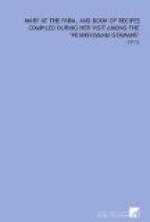“Yes,” said Mary, “but remember, Aunt Sarah, Chautauqua will be held next Summer in a near-by town, and, as Uncle John is one of the guarantors, you will wish to attend regularly and will, I know, enjoy hearing the excellent lectures, music and concerts.”
“Yea,” replied her Aunt, “Chautauqua meetings will commence the latter part of June, and I will expect you and Ralph to visit us then. I think Chautauqua a godsend to country women, especially farmers’ wives; it takes them away from their monotonous daily toil and gives them new thoughts and ideas.”
“I can readily understand, Aunt Sarah, why the poem, ’Life’s Common Things,’ appeals to you; it is because you see beauty in everything. Aunt Sarah, where did you get this very old poem, ’The Deserted City’?”
“Why, that was given me by John’s Uncle, who thought the poem fine.”
“Sad is the sight, the
city once so fair!
An hundred palaces lie buried
there;
Her lofty towers
are fallen, and creepers grow
O’er marbled
dome and shattered portico.
“Once in the gardens,
lovely girls at play,
Culled the bright flowers,
and gently touched the spray;
But now wild creatures
in their savage joy
Tread down the
flowers and the plants destroy.
“By night no torches
in the windows gleam;
By day no women in their beauty
beam;
The smoke has
ceased—the spider there has spread
His snares in
safety—and all else is dead.”
“Indeed, it is a ‘gem,’” said Mary, after slowly reading aloud parts of several stanzas.
“Yes,” replied her Aunt, “Professor Schmidt tells me the poem was written by Kalidasa (the Shakespeare of Hindu literature), and was written 1800 years before Goldsmith gave us his immortal work, ’The Deserted Village.’”
“I like the poem, ‘Abou Ben Adhem and the Angel,’” said Mary, “and I think this true by Henry Ward Beecher:”
“’Do not be troubled
because you have not great virtues,
God made a million spears
of grass where He made one tree;
The earth is fringed and carpeted
not with forests but with grasses,
Only have enough of little
virtues and common fidelities,
And you need not mourn because
you are neither a hero nor a saint.’




